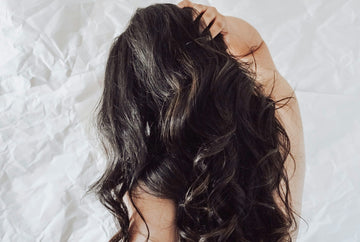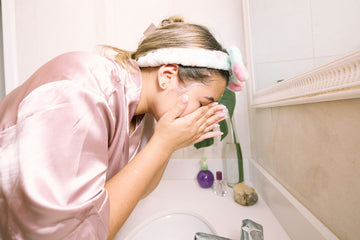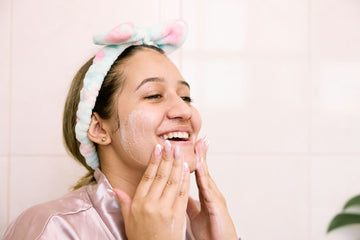Understanding the ingredients in your hair care products is crucial for achieving healthy, vibrant hair. In this article, we'll spotlight key ingredients and their benefits, empowering you to make informed decisions about your hair care routine.
Whether you're looking to combat dryness, boost shine, or strengthen your strands, knowing which ingredients to look for can make all the difference.
Join us as we explore the role that specific ingredients play in addressing common hair care needs, helping you to unlock the full potential of your hair.
Cleansing Agents
When you lather up your shampoo, it's the cleansing agents hard at work to keep your hair fresh and clean. Commonly found in shampoos, sulfates and surfactants are the powerhouses that break down oil, dirt, and buildup on your scalp and hair.
Sulfates, such as sodium lauryl sulfate (SLS) and sodium laureth sulfate (SLES), create that rich, bubbly lather you love. They effectively remove grime but can sometimes be too harsh, stripping your hair of its natural oils.
That's where a sulfate-free shampoo and gentle alternatives come into play. These milder cleansers, often derived from natural sources like coconut or palm oil, offer a gentler clean, maintaining the delicate balance of your hair's natural moisture while still effectively removing impurities.
Whether you opt for traditional sulfates or sulfate-free options, understanding the role of these cleansing agents can help you choose the right shampoo for your hair care needs.
Conditioning Agents
Conditioning agents are essential ingredients in hair care products, designed to enhance your hair's health and appearance. Whether it's silicones, natural oils, or proteins, these agents work wonders in moisturizing, detangling, and improving hair texture.
Silicones, for instance, form a protective layer around each hair strand, locking in moisture and providing a sleek, shiny finish. Natural oils like argan and coconut oil penetrate deep into the hair shaft, offering nourishment and reducing frizz. Proteins such as keratin strengthen hair by filling in gaps along the hair cuticle, which is especially beneficial for damaged or chemically treated hair.
Depending on your hair type, different conditioning agents can offer unique advantages—silicones are great for taming thick, unruly hair, while fine hair benefits from lightweight, natural oils that won't weigh it down.
By understanding how these conditioning agents work, you can choose the right products to keep your hair looking its best.
Humectants and Moisturizers
When it comes to achieving luscious, hydrated hair, understanding the role of humectants and moisturizers is key. Humectants, such as glycerin and hyaluronic acid, are powerful ingredients that attract and retain moisture from the environment, ensuring that each strand of hair stays plump and hydrated.
In contrast, moisturizing ingredients like shea butter and coconut oil work by deeply nourishing and locking in hydration, providing a protective barrier against dryness.
To maximize the benefits of these ingredients, start by applying a humectant-based product to damp hair to draw in moisture. Follow up with a rich moisturizer to seal in that hydration and keep your hair looking soft and healthy.
By incorporating both humectants and moisturizers into your hair care routine, you can achieve optimal hydration and maintain the health and vitality of your locks.
Proteins and Keratin
Proteins and keratin are the backbone of healthy, resilient hair. These vital components work tirelessly behind the scenes to fortify and repair damaged strands, ensuring your hair looks and feels its best.
Proteins like hydrolyzed wheat protein and keratin amino acids are powerhouse ingredients often found in hair care products. They penetrate the hair shaft, reinforcing and rebuilding its structure from within. By filling in gaps and smoothing the hair cuticle, they help restore strength, elasticity, and shine.
Incorporating protein-rich treatments into your hair care routine can make a noticeable difference, leaving you with stronger, more resilient hair that's better equipped to withstand daily wear and tear.
Antioxidants and Vitamins
Antioxidants and vitamins play essential roles in maintaining healthy, vibrant hair. Antioxidants like vitamin E and green tea extract are vital in protecting hair from environmental damage, such as pollution and UV rays, by neutralizing free radicals that can weaken and dull your locks.
Equally important are vitamins like vitamin B5 and biotin, which are celebrated for their abilities to promote hair growth and enhance vitality. Vitamin B5 (also known as pantothenic acid) strengthens hair follicles and prevents hair loss, while biotin supports keratin production, resulting in thicker, stronger hair.
When selecting hair care products, look for those enriched with these powerful antioxidants and vitamins to ensure your hair remains resilient, glossy, and full of life.
Whether it's a nourishing shampoo, a revitalizing conditioner, or a strengthening serum, incorporating products rich in antioxidants and vitamins can significantly contribute to your overall hair health.
Herbal Extracts and Botanicals
Herbal extracts and botanicals have long been cherished for their remarkable benefits in hair care. These natural wonders provide a holistic approach to maintaining vibrant, healthy hair.
Aloe vera, for instance, is renowned for its soothing and moisturizing properties, making it an ideal remedy for dry and irritated scalps. Chamomile, another fan favorite, offers gentle conditioning and imparts a natural shine, while rosemary is celebrated for its ability to stimulate hair growth and improve circulation to the scalp.
Whether you're dealing with scalp irritation, hair loss, or simply seeking to enhance your hair's overall health, incorporating herbal extracts and botanicals into your routine can be a game-changer.
They not only address specific concerns but also offer a therapeutic experience that leaves your hair looking and feeling its best.
Fragrances and Preservatives
Fragrances and preservatives play a crucial role in hair care products, enhancing their appeal and ensuring their longevity.
Fragrances, often derived from a blend of essential oils and synthetic compounds, elevate the sensory experience of using hair care products. They can turn a mundane shower routine into a luxurious, spa-like experience, enveloping users in delightful scents that linger throughout the day.
On the other hand, preservatives like parabens, Phenoxyethanol, and benzyl alcohol are essential for maintaining product stability and safety. These compounds prevent the growth of harmful bacteria and mold, ensuring that your favorite shampoo or conditioner remains effective and safe to use over time.
Together, fragrances and preservatives not only make hair care products more enjoyable but also ensure they deliver consistent, reliable results.
Ingredient Awareness and Product Selection
In today's world, ingredient awareness has become essential for making informed choices about hair care products. Understanding what goes into the products you use can significantly impact the health and appearance of your hair.
Start by paying close attention to ingredient labels; look for key components like keratin for strengthening, argan oil for moisturizing, and biotin for promoting hair growth.
Avoid harmful additives such as sulfates and parabens, which can cause dryness and irritation. By selecting products tailored to your specific hair care needs—whether it's taming frizz, enhancing shine, or boosting volume—you can achieve healthier, more resilient hair. Remember, the right ingredients make all the difference.
Understanding Ingredients in Hair Care Products Conclusion
The key ingredients spotlighted in this article—such as argan oil, biotin, and keratin—offer numerous benefits for hair health. Argan oil provides deep hydration and restores shine, biotin promotes strength and growth, and keratin helps smooth and repair damage.
Understanding these ingredients and their unique advantages is crucial for achieving the hair results you desire. We encourage you to explore and experiment with different hair care ingredients to discover what works best for your specific hair type and concerns.
By doing so, you'll be well on your way to achieving healthier, more vibrant hair.






